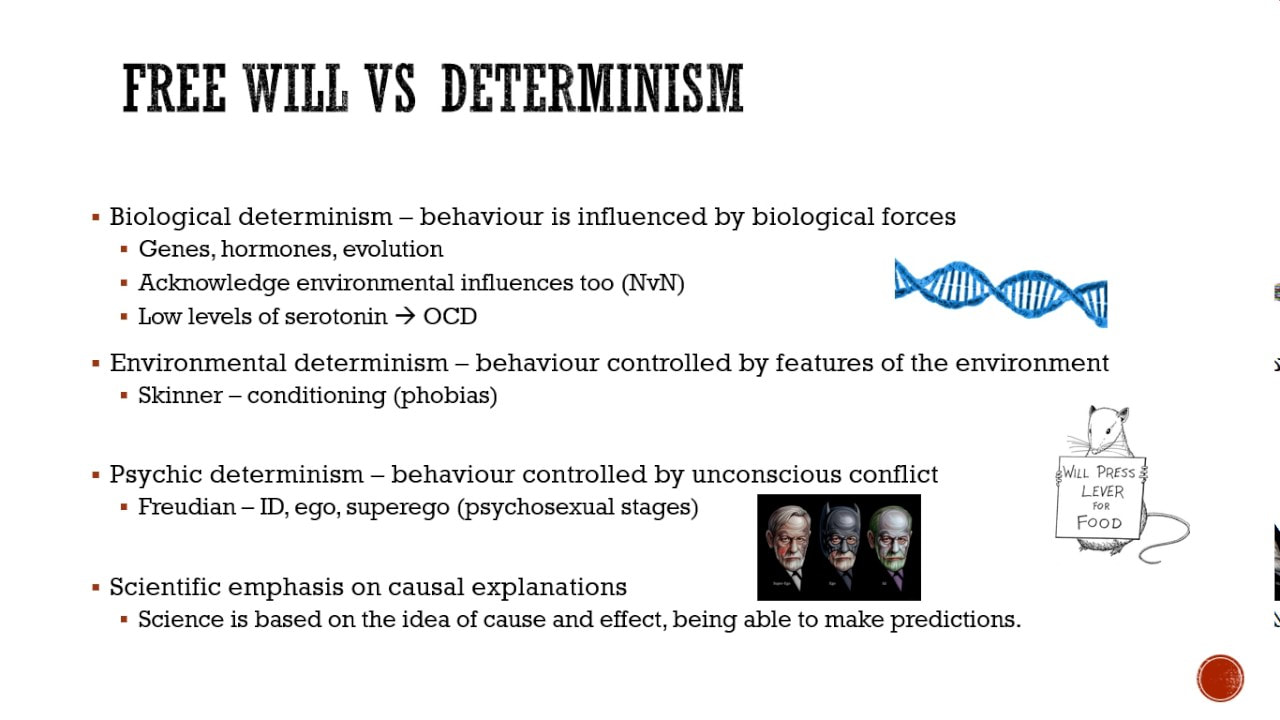Summary of the Debate
|
Free will assumes that a person:
• has control over their behaviour • is responsible for their own actions. • behaviour is not predictable. Strengths • Individual responsibility. • Emphasis on the individual. • Suggests behaviour is free Weaknesses • Unscientific - behaviour can’t be predicted or objectively measured • No clear definition of the term ‘free will’ |
Determinism assumes that:
• behaviour controlled by forces outside your control • Behaviour is predictable. • Behaviour is controllable. Strengths • Emphasis on cause and effect • Encourages interventions / therapies Weaknesses • Ignores free will over behaviour • Behaviour is too complex and variable • Doesn’t blame people for their behaviour |
Discuss the free will/determinism debate in psychology. Use examples from relevant core studies to support your answer. [15]
This requires 4 x Point - Explanation - Example - Conclusion - Challenge.
Introduction
Point
Recognises freedom of choice
Explanation
…gives people responsibility for their actions...
Example
Milgram (1963) showed that not all participants obeyed the authority figure by shocking the learner to 450 volts. 14 participants dropped out at some stage between 300 and 450 volts demonstrating their free will not to harm another person.
Conclusion
Generally we like people to be blamed / praised for their choices
Challenge
However, just because free will suggests you can be blamed does not mean that it is right to do so, there may be mitigating circumstances.
Paragraph 2: weakness of free will
Point
…Difficult to test and measure…
Explanation
…if someone exercises free will then are they just responded to a command to do so (determinism)…
Example
Bocchiaro et al. (2012) showed that people often obey in ways that they would not predict when faced with certain situations…
Conclusion
Difficulty being measured means it is not possible to predict / change behaviour
Challenge
However, just because free will is difficult to define and measure does not mean that it does not exist.
Paragraph 3: strength of determinism
Point
….Able to establish cause and effect….
Explanation
…by isolating variables which will determine the behaviour …
Example
Grant et al. (1998) demonstrated that level of recall is determined by context, so we can advise people not to revise in noise
Conclusion
…Allows people to predict / change behaviour …
Challenge
However, this is reductionist and does not acknowledge individual differences.
Paragraph 4: weakness of determinism
Point
… Treats people like ‘machines’ that are programmed …
Explanation
Suggesting that they cannot exercise free will …
Example
Bandura et al. (1961) demonstrated that not all behaviours are automatically imitated suggesting children make choices about who they model and what they mode …
Conclusion
We want to believe that we are in charge of our behaviour
Challenge
However, just because we believe that we are in charge does not mean to say that we are. It can be argued that a cause has not yet been discovered.
Final Conclusion – this is NOT necessary
Psychology is most often on the determinism side, showing soft determinism (behaviour is predictable but not inevitable).
This requires 4 x Point - Explanation - Example - Conclusion - Challenge.
Introduction
- Free will: The idea that individuals are in control of their destiny and make conscious decisions that affect their behaviour.
- Determinism: The idea that behaviour is determined by forces beyond the individual’s control which can be both internal and external.
Point
Recognises freedom of choice
Explanation
…gives people responsibility for their actions...
Example
Milgram (1963) showed that not all participants obeyed the authority figure by shocking the learner to 450 volts. 14 participants dropped out at some stage between 300 and 450 volts demonstrating their free will not to harm another person.
Conclusion
Generally we like people to be blamed / praised for their choices
Challenge
However, just because free will suggests you can be blamed does not mean that it is right to do so, there may be mitigating circumstances.
Paragraph 2: weakness of free will
Point
…Difficult to test and measure…
Explanation
…if someone exercises free will then are they just responded to a command to do so (determinism)…
Example
Bocchiaro et al. (2012) showed that people often obey in ways that they would not predict when faced with certain situations…
Conclusion
Difficulty being measured means it is not possible to predict / change behaviour
Challenge
However, just because free will is difficult to define and measure does not mean that it does not exist.
Paragraph 3: strength of determinism
Point
….Able to establish cause and effect….
Explanation
…by isolating variables which will determine the behaviour …
Example
Grant et al. (1998) demonstrated that level of recall is determined by context, so we can advise people not to revise in noise
Conclusion
…Allows people to predict / change behaviour …
Challenge
However, this is reductionist and does not acknowledge individual differences.
Paragraph 4: weakness of determinism
Point
… Treats people like ‘machines’ that are programmed …
Explanation
Suggesting that they cannot exercise free will …
Example
Bandura et al. (1961) demonstrated that not all behaviours are automatically imitated suggesting children make choices about who they model and what they mode …
Conclusion
We want to believe that we are in charge of our behaviour
Challenge
However, just because we believe that we are in charge does not mean to say that we are. It can be argued that a cause has not yet been discovered.
Final Conclusion – this is NOT necessary
Psychology is most often on the determinism side, showing soft determinism (behaviour is predictable but not inevitable).
| comparing_the_debates.pptx | |
| File Size: | 189 kb |
| File Type: | pptx |
Comparing the Debate with Other Debates
Nature / nurture
Determinism can be linked to nature because both focus on establishing cause and effect, particularly when investigating genetics. Nurture also tends to be deterministic as behaviourist research believes that factors in the environment can be isolated and understood to be directly causing behaviour.
Individual / Situational Explanations
Determinism is similar to situational explanations that focus on specific factors which cause behaviour, which are predictable. Individual explanations tend to favour explanations that include freewill and are less predictable.
Reductionism / Holism
Determinism and reductionism have similar assumptions about behaviour being predictable and using a scientific approach to explain human behaviour.
Usefulness
Determinism is very useful when trying to develop treatments; but biological treatments may lack effectiveness in the long-term as behaviours return. Freewill is useful for developing therapies whereas determinism helps the development of very measurable treatments
Ethics
Determinism has the danger of causing psychological harm due to the implications research may have such as genetic causes of behaviour or poor upbringing
Socially Sensitive Research
Deterministic explanations can lead to socially sensitive research as they suggest there is a clear cause for behaviour. This can lead to labelling and discrimination and may remove personal responsibility.
Psych as a Science
Determinism aims to be scientific however it can never lead to perfect predictions due to the complexity of human behaviour and the difficulty isolating variables completely. Determinism does utilise many scientific methods compared to freewill.
Nature / nurture
Determinism can be linked to nature because both focus on establishing cause and effect, particularly when investigating genetics. Nurture also tends to be deterministic as behaviourist research believes that factors in the environment can be isolated and understood to be directly causing behaviour.
Individual / Situational Explanations
Determinism is similar to situational explanations that focus on specific factors which cause behaviour, which are predictable. Individual explanations tend to favour explanations that include freewill and are less predictable.
Reductionism / Holism
Determinism and reductionism have similar assumptions about behaviour being predictable and using a scientific approach to explain human behaviour.
Usefulness
Determinism is very useful when trying to develop treatments; but biological treatments may lack effectiveness in the long-term as behaviours return. Freewill is useful for developing therapies whereas determinism helps the development of very measurable treatments
Ethics
Determinism has the danger of causing psychological harm due to the implications research may have such as genetic causes of behaviour or poor upbringing
Socially Sensitive Research
Deterministic explanations can lead to socially sensitive research as they suggest there is a clear cause for behaviour. This can lead to labelling and discrimination and may remove personal responsibility.
Psych as a Science
Determinism aims to be scientific however it can never lead to perfect predictions due to the complexity of human behaviour and the difficulty isolating variables completely. Determinism does utilise many scientific methods compared to freewill.




